RUAIRI QUINN wrong to deny redress to Bethany Home survivors - here is the evidence
 national |
rights, freedoms and repression |
feature
national |
rights, freedoms and repression |
feature  Friday June 24, 2011 17:58
Friday June 24, 2011 17:58 by Derek Leinster - Bethany Survivors Group
by Derek Leinster - Bethany Survivors Group derek.linster at talktalk dot net
derek.linster at talktalk dot net 42 Southey Road Rugby CV22 6HF Warwickshire
42 Southey Road Rugby CV22 6HF Warwickshire 00 44 1 788 81731
00 44 1 788 81731
Minister for Education ignores evidence given to him at meeting
In letters to Joe Costello TD and Bethany Home Survivors Chairperson, Derek Leinster (attached), Ruairi Quinn TD, Minister for Education, turned down the survivors' request to have the Home included in the Schedule to the Residential Institutions Redress Scheme.
They met the Minister on 24 May last, accompanied by other survivors from the home, and by Niall Meehan from Griffith College Dublin. Inclusion is necessary in order for survivors to apply for compensation for the neglect they suffered in the home that the state was aware of but ignored.
Related Links:
Further Information (Indymedia):
New Church of Ireland Archbishop of Dublin speaks on Bethany Home
Bethany Home Children’s Graves discovered
Former residents call for memorial - Wednesday 26th May, 12 noon, at MOUNT JEROME Cemetery
From Wicklow to Wakefield - a victim of Protestant prejudice and state neglect. Derek Leinster survived to become a trade union convener, a father and a grandfather
Quinn rejects Bethany survivors' redress call
Death every 3 weeks at Bethany Home - research
Bethany survivors demand redress inclusion
Further information (RTE):
Quinn rejects Bethany survivors' redress call |
Death every 3 weeks at Bethany Home - research |
Bethany survivors demand redress inclusion
[Bethany Home, Orwell Road, Rathgar, Dublin, was a Protestant evangelical home for unmarried mothers, a children's home, that also housed women convicted of infanticide, prostitution and petty theft - who were referred there by the courts from the 1920s to the 1960s. In 1945 it was also recognised as a place of detention under the Children's Act 1908. It was opened by the Church of Ireland (cofI) Archbishop of Dublin in 1922 and closed in 1972. The Irish Church Missions to the Roman Catholics (a CofI missionary society) was the dominant influence until the mid 1950s. After closure, the Home's assets were distributed in 1974: 85% to the Church of Ireland Magdalen Home on Leeson St and 15% to Miss Carr's Home, North Circular Road, Dublin.]
Bethany survivors spokesperson Derek Leinster, who was in Bethany Home from 1941-45 said,
'In his reply to me and to Deputy Joe Costello, Minister Quinn ignored the arguments we put to him.
He regurgitated the tired excuses of his Fianna Fail predecessors in turning down Bethany survivors. In opposition the Labour Party supported including Bethany on the Schedule to the Redress Scheme. In power, what is good enough for Fianna Fail is good enough for Ruairi Quinn.
We gave him documents proving that state officials, in particular then Deputy Chief Medical Adviser, Winslow Sterling Berry, ignored evidence of neglect and record numbers of deaths in Bethany Home in the late 1930s. In answer to internal and external criticism of the home's standards of care Sterling Berry said, "It is well recognised that illegitimate children are delicate". Berry then forced the home, in his presence, to cease admitting Roman Catholics, so as to give him and other state officials a quieter life. We discovered 219 unmarked graves of Bethany children in 2010. Over a third died in the five year period (1935-39) before Sterling Berry entered the Bethany Home. That was five years after the state took on statuary powers in 1934 to inspect and to regulate maternity homes like Bethany.
'Ruairi Quinn has refused to address the then state's decision to regulate the sectarianism of the welfare system, but not the actual welfare of neglected and abandoned children. Ruairi Quinn is condoning official sectarianism today in this republic, as a result.
'Ruairi Quinn has rejected not just Bethany survivors but his own party colleagues Joe Costello and Kathleen Lynch who have been campaigning for years on this issue. Junior Minister Kathleen Lynch was thrown out of the Dail last October while trying to raise the issue of Bethany survivors with the then Fianna Fail minister.
'Junior Minister Kathleen Lynch is currently examining whether another rejected group, the Magdalene women, should be given compensation for the appalling abuse they suffered, which the state has also so far ignored. At a parliamentary Labour Party meeting last week Joe Costello asked her to also examine the Bethany Home issue. She said she would.'
Letter from Derek Leinster and Niall Meehan to Minister for Education, Ruairi Quinn
Dear Minister for Education, Ruairi Quinn,
Thank you for your letters of 17 June 2011 to Joe Costello and to Derek Leinster in response to points put to you by Bethany survivors, Níall Meehan and Joe Costello TD, who met you on 24 May last.
Bethany Home, a Protestant evangelical institution, was, to cite the statutory basis for insertion into the Schedule to the Residential Institutions Redress Scheme, a ‘children’s home… in which children were placed and resident… in respect of which a public body had a regulatory or inspection function’. You have decided not to include Bethany Home, though it meets the stated criteria.
Possibly, this is because your letter does not address the reasons put by the Bethany delegation for inclusion within the Schedule. Your letter raises issues that, while important, did not constitute the basis of the argument put to you and which, consequently, your reply has failed to address.
Since 1917, according to Mary Raftery (writing in 2004), ‘Protestant children in need of care’ were ‘essentially dealt with by private institutions’. She suggested that the state’s attitude was one of ‘hands-off’. As a result, she went on, ‘It is difficult to find any State records relating to the Protestant children's homes’. Our research into Bethany Home indicates that it is precisely this policy decision not to interfere which is the reason for neglect and death in the Bethany Home and the reason why the state is culpable.
There are in fact state records explaining why the state decided not to interfere when confronted with evidence of severe neglect in the Bethany Home. We supplied these records to you and you have not addressed them. We summarise them here.
Record numbers of children died in Bethany between 1935-39, buried in unmarked graves in Mount Jerome cemetery. Over a third of the 219 unmarked graves discovered for the period 1922-49 originated in this period.
Statutory inspection of maternity homes began in 1934 and Bethany registered in 1935. In January 1939 specific criticism of Bethany’s standards of care was reported within the Department Local Government and Public Health. In August 1939 public criticism of Bethany was raised at a meeting of the Rathdown Board of Guardians and published in the Irish Times and Independent. The Board of Guardians asked the Minister to report back to them on sick children removed from Bethany who required hospitalisation.
The Deputy Chief Medical Adviser, Winslow Sterling Berry, entered Bethany once in February and twice in October 1939. The evidence shows that he engaged in a damage limitation exercise.
In February he dismissed criticism from a departmental inspector who wanted a Bethany nurse mother prosecuted for severe neglect. In October, after the August meeting of the Rathdown Board of Guardians, Sterling Berry entered Bethany twice. He wrote in relation to criticism of standards of care in Bethany,
‘it is well recognised that a large number of illegitimate children are delicate’. He then went on to assert that Bethany’s problem was that it was a proselytising institution and that he proposed, as Deputy Chief Medical Adviser, to end the practice of attempting to convert Roman Catholics by banning their presence. On his third and final visit he reported being present at the special meeting he initiated, where it was agreed to cease admitting Roman Catholics.
You, as Minister in this Republic in 2011, must address the Deputy Chief Medical Advisor’s use of his statutory power in this manner in 1939. It is regrettable that you have not done so in your reply.
Our conclusion, which the evidence shows to be irrefutable, is that in southern Ireland’s sectarian welfare system state officials were concerned to regulate sectarianism but not welfare. Leveling the playing field in this way gave prejudiced officials an easier life. It also fatally compromised the inspection regime in Bethany. Children continued to die and to become ill in significant numbers. Nearly two thirds of the 219 unmarked graves originated in the 10 year 1935-44 period. This needless slaughter ended when Bethany was given a Maternity grant in 1949, something originally expected by Bethany’s management in 1940, after the Catholic ban.
Sterling Berry’s exercise in prejudice was as illegal in 1939 as it is today. What should have happened?
On one other documented occasion a senior medical adviser entered a mother and babies home. Newly appointed (in 1944) Chief Medical Adviser James Deeny visited Bessbrook, Cork, arising from reports of unusually high mortality. Just as Sterling Berry said of Bethany, Bessbrook seemed ‘clean’ and ‘well run’. However, unlike his deputy, Deeny physically examined a number of children. He found them to be suffering from a range of preventable conditions that were causing the unnecessarily high mortality. According to Deeny, ‘The deaths had been going on for years. They had done nothing about it’. He, ‘closed the place down and sacked the Matron, a nun, and also got rid of the medical officer’.
Had Sterling Berry been less fixated on private denominational matters that were none of his statutory business, and more concerned with his statutory responsibility for public welfare, children’s lives might have been saved. Sterling Berry retired from the Department in 1946, while Deeny authored the 'Mother and Child legislation' that Noel Browne failed to have enacted in 1949-50. Doctors and the Church of Ireland Gazette saw it as ‘communist’ interference in the family. The Roman Catholic Church weighed in, condemned and effectively killed the legislation for similar reasons.
Religiously and privately run welfare on the cheap continued.
Raftery's conclusion from her analysis in 2004 bears repetition,
'The fact that the Government uses its past neglect of this section of the community to argue that it now has no responsibility to even hear their case for redress is shameful and unjust. The number of children in this category was always small. However, the abuse some of them suffered was no less real or damaging than that of their Catholic counterparts.'
In relation to your point about ‘exclusion of the Bethany Home for religious grounds’, you fail to address the fact that originally in 2002, no Protestant institution was included in the Schedule to the Redress Scheme. Mary Raftery again, who also pointed out that the 2002 Redress scheme originally excluded mother and baby homes like Bethany. However, St Patrick’s, one of the State’s largest, was one of 13 institutions added in 2004. As it was Roman Catholic, she continued, ‘Consequently, the exclusion of similar Protestant institutions does indeed begin to appear worryingly sectarian’. Raftery went on: "A further Church of Ireland institution excluded is the former Smyly's Boys' Home... A number of ex-residents have alleged that they were severely abused there as children... this group feels that it has been sidelined because of its religion".
As a result of this and of continuing pressure and complaints from Derek Leinster, Smiley's was then included. Also included was the Protestant run Miss Carr's home, said to have been one of the best run children's homes in the state. One puzzled former resident of Miss Carr’s home we have spoken to threw away his Redress Scheme invitation to apply for compensation. Yet Bethany Home, from which hundreds were sent to unmarked graves, was still not included. To paraphrase James Deeny, it had been going on for years and nothing was done about it. Now, today, you want to do nothing about it.
Just as with the Magdalene laundry institutions, the state argues that women referred to Bethany by the courts from 1924 to 1965 (for crimes ranging from petty theft to infanticide), entered there voluntarily. Leaving that spurious argument aside, the point is that the state had a regulatory duty of care that it abandoned. It abandoned it in an institution where it was deemed acceptable to lock up women charged with infanticide and petty crime with unmarried mothers and their abandoned and then neglected offspring. The state’s washing of its hands of its responsibility is a further abandonment.
That is not acceptable in this Republic.
Please, in the name of decency and of justice, withdraw the letter issued in your name, possibly by a misguided civil servant, and get to the heart of this matter.
Bethany survivors deserve redress. We would like you to address the points made here that are central to the case for including Bethany Home in a scheme of redress.

Child deaths soared after Bethany Home was supposed to be 'inspected' by the Department of Local Government and Public Health

Deputy Chief Medical Adviser, a state official, reveals state prejudice, ignores neglect and death
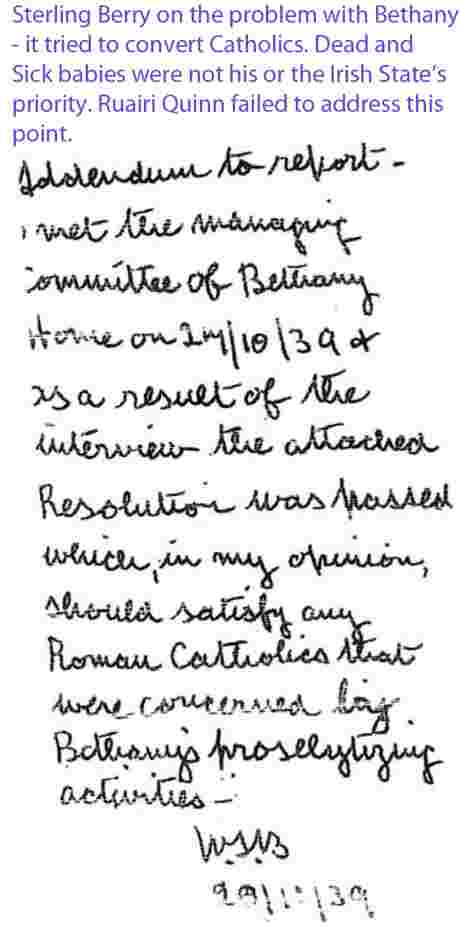
Deputy Chief Medical Adviser stops Bethany admitting Roman Catholics - hopes that will make the negative publicity problem about sickness and death go away

Department inspector wants Bethany nurse mother prosecuted - Deputy Chief Medical Adviser exonerates her, says child was 'delicate' and needed 'country air'
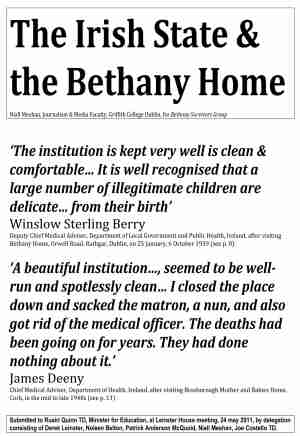

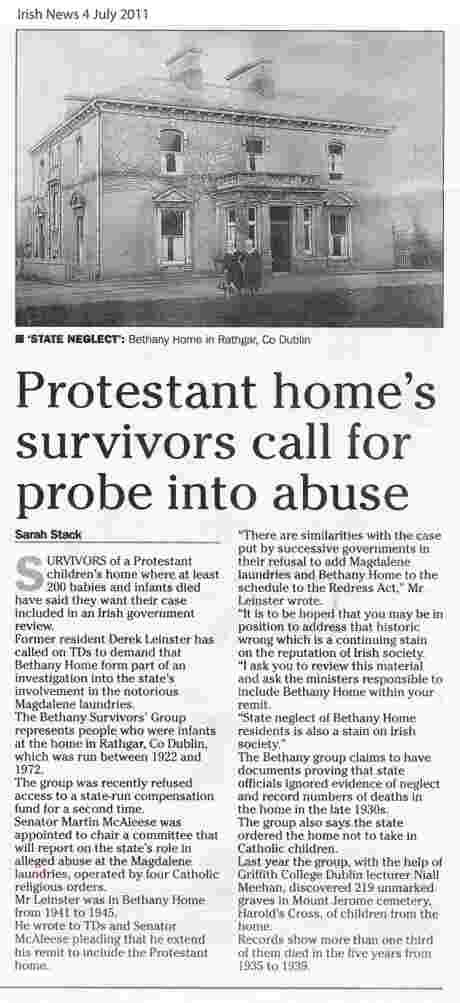
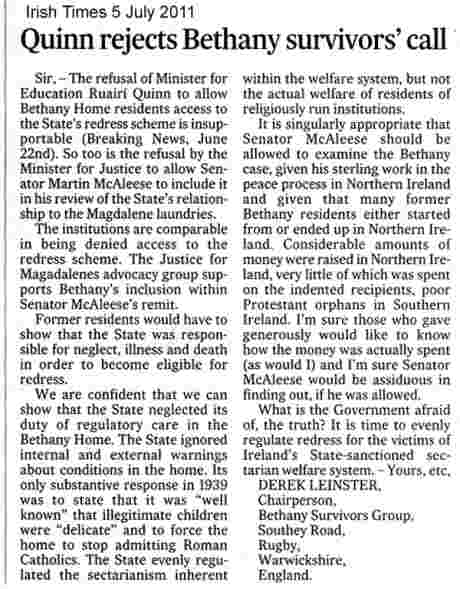
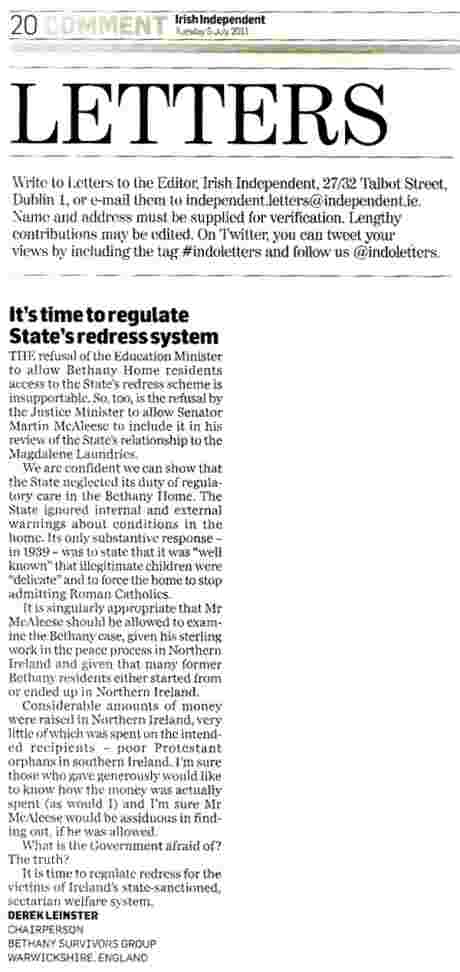
Comments (5 of 5)
Jump To Comment: 1 2 3 4 5These are some more items of evidence that the Minister for Education failed to address.
If he thinks the Bethany survivors are going away, he is mistaken. Perhaps he thinks he can deny until we die. If so, his decision of 22 June 21011 may come back to haunt him.
Deputy Chief Medical Advisor exonerates nurse mother inspector wanted prosecuted - sick child was 'delicate' and needed 'country air'
State says no to state aid 1943 - children continue to die until it is granted in 1949
Bethany Home thought aid would come with the ban on Catholics - they had to wait 10 years (in which children continued to die)
State knew children were being sent illegally to England - and did nothing
Being in Bethany home made children sick - in 1944 Derek Leinster entered Cork Street Isolation Hospital suffering from Pertussis, Br. Pneumonia, Diphtheria & Enteritis - he should have died (like 16 others that year). Today he suffers from continuing deb
None of this material was considered by the minister in his response to me and to Joe Costello TD.
1936 - the year a record 29 children were buried in unmarked graves - no discussion - Bethany management had other priorities
Both of these Medical Advisers exceeded their authority - which one saved children's lives?